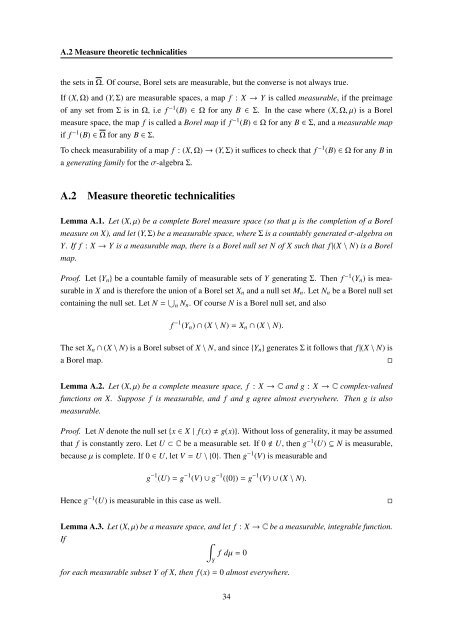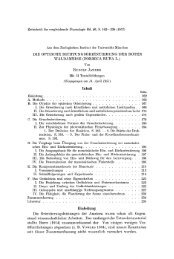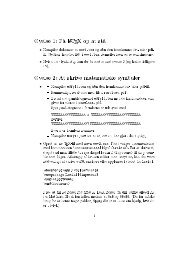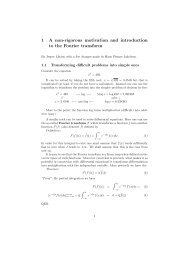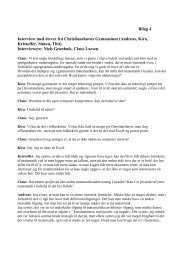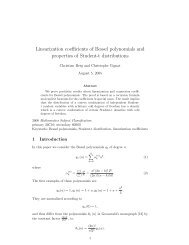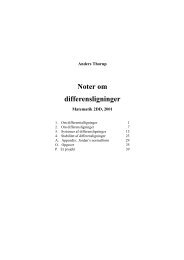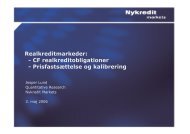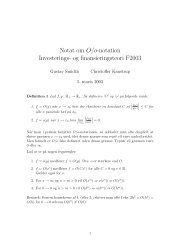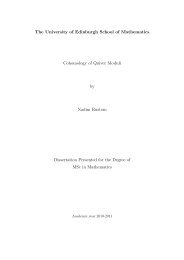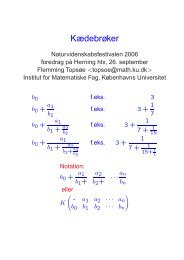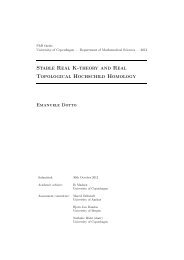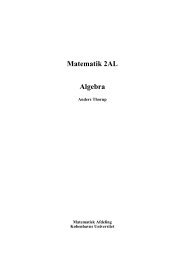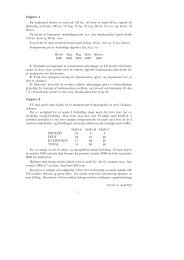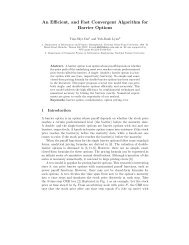Disintegration theory for von Neumann algebras
Disintegration theory for von Neumann algebras
Disintegration theory for von Neumann algebras
You also want an ePaper? Increase the reach of your titles
YUMPU automatically turns print PDFs into web optimized ePapers that Google loves.
A.2 Measure theoretic technicalities<br />
the sets in Ω. Of course, Borel sets are measurable, but the converse is not always true.<br />
If (X, Ω) and (Y, Σ) are measurable spaces, a map f : X → Y is called measurable, if the preimage<br />
of any set from Σ is in Ω, i.e f −1 (B) ∈ Ω <strong>for</strong> any B ∈ Σ. In the case where (X, Ω, µ) is a Borel<br />
measure space, the map f is called a Borel map if f −1 (B) ∈ Ω <strong>for</strong> any B ∈ Σ, and a measurable map<br />
if f −1 (B) ∈ Ω <strong>for</strong> any B ∈ Σ.<br />
To check measurability of a map f : (X, Ω) → (Y, Σ) it suffices to check that f −1 (B) ∈ Ω <strong>for</strong> any B in<br />
a generating family <strong>for</strong> the σ-algebra Σ.<br />
A.2 Measure theoretic technicalities<br />
Lemma A.1. Let (X, µ) be a complete Borel measure space (so that µ is the completion of a Borel<br />
measure on X), and let (Y, Σ) be a measurable space, where Σ is a countably generated σ-algebra on<br />
Y. If f : X → Y is a measurable map, there is a Borel null set N of X such that f |(X \ N) is a Borel<br />
map.<br />
Proof. Let {Y n } be a countable family of measurable sets of Y generating Σ. Then f −1 (Y n ) is measurable<br />
in X and is there<strong>for</strong>e the union of a Borel set X n and a null set M n . Let N n be a Borel null set<br />
containing the null set. Let N = ⋃ n N n . Of course N is a Borel null set, and also<br />
f −1 (Y n ) ∩ (X \ N) = X n ∩ (X \ N).<br />
The set X n ∩ (X \ N) is a Borel subset of X \ N, and since {Y n } generates Σ it follows that f |(X \ N) is<br />
a Borel map.<br />
□<br />
Lemma A.2. Let (X, µ) be a complete measure space, f : X → C and g : X → C complex-valued<br />
functions on X. Suppose f is measurable, and f and g agree almost everywhere. Then g is also<br />
measurable.<br />
Proof. Let N denote the null set {x ∈ X | f (x) g(x)}. Without loss of generality, it may be assumed<br />
that f is constantly zero. Let U ⊂ C be a measurable set. If 0 U, then g −1 (U) ⊆ N is measurable,<br />
because µ is complete. If 0 ∈ U, let V = U \ {0}. Then g −1 (V) is measurable and<br />
g −1 (U) = g −1 (V) ∪ g −1 ({0}) = g −1 (V) ∪ (X \ N).<br />
Hence g −1 (U) is measurable in this case as well.<br />
□<br />
Lemma A.3. Let (X, µ) be a measure space, and let f : X → C be a measurable, integrable function.<br />
If<br />
∫<br />
f dµ = 0<br />
<strong>for</strong> each measurable subset Y of X, then f (x) = 0 almost everywhere.<br />
Y<br />
34


